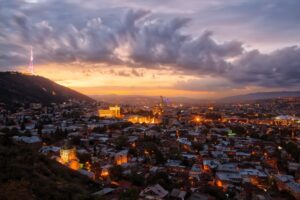The International Conference for Health and Human Rights (ISHHR) is one of the most important conferences for organisations working in the treatment and rehabilitation of survivors of human rights abuses.
Service providers and representatives of human rights organisations from every continent attend this event, therefore providing an excellent environment for informal networking, the exchange of knowledge, experience, developments, clinical practice and research and discussions about various strategies to address the health needs of survivors of human rights violations.
ISHHR has convened nine international conferences for health and human rights: France (1987), Costa Rica (1989), Chile (1991), the Philippines (1994), South Africa (1998), Croatia (2001), India (2005), Peru (2008), Georgia (2011) and Serbia (2017).
The 11th conference in Colombia, 21-25 November, 2022:
The 11th Conference of the International Society for Health and Human Rights (ISHHR), Collective Healing: Restoring the Relationship between Humanity and Nature, took place from November 21 to 25, 2022, at the Pontificia Universidad Javeriana in Bogotá, Colombia.
After five years of postponements and three years of general pandemic, global unrest, and donors` apparent lack of interest in Human Rights, the ISHHR Secretariat was uncertain that Bogotá 2022 would become a reality. Fortunately, the generous support of the Norwegian Human Rights Fund (FNDH), ImaginAction, Re-Conectando, the Pontificia Universidad Javeriana (PUJ) and the New South Wales Service for the Treatment and Rehabilitation of Survivors of Trauma and Torture of Australia (STARTTS) made the conference possible.
The 9th conference in Georgia, 6-9 October, 2011:
– Doing Justice, Building Capacity

The four day conference was traditionally subdivided into two sections: two days of pre conference capacity building and training workshops; and two days of plenary sessions, along with two keynote lectures given by Emeritus Prof. Vamik Volkan (TRNC/US) and Dr. Pau Perez Sales (Spain).
Many thanks to all our sponsors, contributors and delegates who made the 9th international ISHHR workshops &conference a big success!
Special thanks to:
Amber Gray, Archil Talakvadze, Crystal Riley, Prof. Dean Ajdukovic, Dr. Eileen Pittaway, volunteer extraordinaire Gary Taylor, Héctor Aristizabal, Dr. JoséQuiroga, Lela Tsiskarishvili, Dr. Megan Berthold, all-rounder extraordinaire Nino Agdgomelashvili, Nino Makhashvili, Dr. Pau Pérez, Rosa Lía Chauca, Professor Emeritus Vamik Volkan and to allmembers of the local organising committee, ISHHR board members and our volunteers…
The 8th conference in Peru, 15-18 October, 2008:
– Truth, Justice and Reparation; Rebuilding Health and Dignity after Trauma and Human Rights Violations

The 8th ISHHR Conference was again a very valuable experience for participants. It promoted the exchange of information between new and old members of ISHHR and between the host country and international communities. It increased understanding and solidarity between attendees, mostly colleagues who shared similar challenges in different cultural and geographical settings, with invaluable knowledge and experiences for assisting their own practices and management of clients. It also provided a significant personal benefit t for individual participants who have survived human rights violations by enabling them to tell their stories and share their experiences with people who share common ground.
We are thankful for the support and funding provided by Friends of STARTTS and sponsorship from the Dutch government through its Embassy in Peru, as well as the government of New Zealand.
The 7th conference in India, 2-5 February, 2005:
– Resilience, Recovery and Reconstruction

A main focus at this present conference was directed towards the training health professionals in work with torture and violence, where emphasis was also given to building the well being of individuals and communities, learning from efforts and experiences from initiatives of reconciliation. A holistic approach to healing trauma was stressed, giving importance to the culture and tradition of the country where relief work is being done and to the necessity of developing community-based, culturally grounded programs of psychosocial support that link relief and development assistance to war-affected children, families and communities.
The 7th International Conference for Health and Human Rights, titled “Resilience: Recovery: Reconciliation” was planned and implemented by the local organizing committee. This committee, chaired by Dr. Vijay Shah and Organizing Secretary Dr Sandeep Shah worked collaboratively with the international program committee, chaired by Dr Nora Sveaass.
Download 2005 Narrative Report
The 6th conference in Croatia, 21-24 June, 2001:
– Strengthening Resources for Community Reconstruction
The main aim of the Conference was to focus on and develop ways of addressing destabilised communities from a human rights and health perspective. Both title and aim of the Conference underline the shift in the professional paradigm in the area of trauma, human rights violations and health. Whereas pathology and treatment on an individual level were subjects highly focused during our first international conference in 1987, in Paris, France, the attention at the present moment is directed towards interventions at a community level aiming at strengthening coping abilities and resilience of those affected by human rights’ violations. Many presentations during the Conference, and more specifically during the first day, June 21, discussed practical experiences and results of based on studies concerning Community Reconstruction in the aftermath of war and violence..
The 6th International Conference for Health and Human Rights, entitled “Communities in Crisis: Strengthening Resources for Community Reconstruction” was prepared by the local organising committee, chaired by Dean Ajdukovic, and the international program committee, chaired by Loes van Willigen.
Download 2001 Narrative Report
The 5th conference in South Africa, 3-6 December, 1998:
– Conflict, Health and Social Reconstruction
From the outset the conference emphasised the importance of exchange, cultural diversity and action-oriented outcomes. It provided an opportunity for participants to meet, share experiences and engage in dialogue in a safe, supportive environment. The development community building strategies and opportunities for contact with local communities was fostered at the conference.
Key Themes Dialogued at the Conference:
- Truth, Justice and Reconciliation
- Children, Trauma and Oppression
- Gender, Trauma and Oppression
- The Uprooted People, Forced Migration and Repatriation
- Treatment, Diagnosis and Evaluation
- Indigenous Healing, Ideology and Community Development
Collaborative networking and the sharing of skills and expertise across regions was an overwhelming success at the conference. The contributions were active and enthusiastic which resulted in the success and dynamism of the strategies for future work in the field of human rights.
It is important to note that discussions among participants highlighted the need to develop further opportunities for cooperation and coordination, and assisting Regional partners for forthcoming international conferences. The exchange of skills and the development of capacity in developing countries were deemed crucial for the future.
Download 1998 Narrative Report
Other past conferences
- The Philippines 1994: The 4th conference
- Chile 1991: The 3rd conference
- Costa Rica 1989: The 2nd conference
- France 1987: The 1st conference
